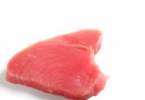Today’s question: can dogs eat ginger? Is ginger good or bad for dogs? Scroll down for detailed answers.
Ginger is popular as herb/food/seasoning/essential oil used within a great many of recipes and home remedies. Ginger can be used for flavor on food, as an oil for aromatherapy, as a cream or oil for topical use, of as a medication for digestion and stomach issues. Ginger is used to flavor many things, especially Asian curries, and is also found in many smoothies and fruit juices because of the health benefits it can bring to humans. Ginger can be grown at home or on a farm, adding to the ease of use of the food. Growing your own supplements for you and your dog add to the benefit of the food since the ginger will be organic and free of pesticides. Always in ready supply when you have your own stash, ginger can be on hand for a great many purposes. Ginger’s multiple benefits make dog lovers wonder: Can dogs eat ginger?
An upset stomach leaves many people reaching for a ginger beer (ginger ale). Ginger ale has been a wonderfully soothing concoction for many over the course of generations. A bit of ginger ale can be added to the water of the water bowl your dog uses when you know your dog will need a bit of help settling his/her stomach. Used as a homeopathic remedy and within essential oils, the popularity of ginger is rising with all of the uses for the spice coming into common knowledge. Ginger can be added to most any food or drink with little recourse or risk of side effects. The taste may also be masked if a pup finds the taste unappealing. Ginger may also be used aromatically. Adding ginger to an aromatherapy diffuser, or having your dog smell the ginger oil, or herb itself, may aid in your dog’s ability to ingest the food and tolerate any potential reactions that may occur. Ginger in all forms is a very low risk food/herb, therefore, most any method your choose for your dog to ingest the ginger should work without issue.
All of these wonderful and natural uses for ginger make many dog owners wonder whether their dogs can eat ginger too? Will ginger settle a dog’s stomach? Will ginger add a bit of Asian flair to puppy chow?
Can dogs eat ginger?
The answer is yes, but only in limited quantities. As with most foods, dogs should only eat special foods and seasoning in moderation. Over consumption of any type of food can cause stomach upset and extreme discomfort, and an allergic reaction. For those who are unsure in regards to breed tolerance of a certain spice, the best bet is to contact a veterinarian and have advice offered from an official source.
Benefits of ginger
The most obvious benefit of ginger is the assistance it provides to the digestive function. It is useful in combating and helping with upset stomachs or vomiting. Ginger has been used for ages in the treat of human gastrointestinal problems. This natural remedy often works better, and more often, than store bought medicines. When having so much success personally with ginger, one may see their dog with tummy troubles and wish to extend the favor ginger offers an achy belly.
A vomiting dog is a distressing thing for a dog owner. Not simply because of the mess involved but because no one wants to see their precious pooch in distress. Dogs may have an extra amount of stress when vomiting because a dog is not aware the vomiting will end and he/she will feel better soon. Ginger can help soothe the stomach of dogs, just as with humans. For those dogs that suffer from car sickness, some raw or powdered ginger half an hour before a trip can really help the dog avoid having that feeling of queasiness (and help you by keeping your car clean and fresh smelling…!). When a thunderstorm is looming, or the 4th of July fireworks will be starting soon, a bit of ginger may help the pup avoid a nervous stomach and prevent a bout of vomiting due to anxiety.
A bloated dog (gastric dilation volvulus) occurs when the dog cannot expel food and gases in the stomach, especially in larger breeds. Bloat can be very uncomfortable initially, then become unbearably painful as time goes on. If not resolved quickly, bloat can and will become far more life threatening. If the symptoms of bloat are not discovered within hours of appearing, the dog can die. To avoid developing bloat, ginger can be added to the diet of a dog at risk. Ginger can help to stimulate bowel movements, which will empty the stomach and should relieve the problem.
Ginger has so many remedies for digestion issues, but ginger may also be used to combat larger health problems. Even cancers are not immune to the benefits of ginger. The herb has been shown to fight the spread and slow the growth of cancerous cells. It has also been observed to kill lymphosarcoma. Generally assisting the immune system, ginger is a great tool as part of a number of other agents in fighting the prevention of cancers in dogs and limiting the spread of those already present. A ginger supplement to your diet will kick start your immune system for sickness prevention while also naturally treating the ailments that have already developed.
Another benefit of ginger is that the herb can help with osteoarthritis. Ginger is a natural anti-inflammatory and therefore offers relief to arthritic dogs. Inflamed joints are always grateful to receive ginger into the diet! Dogs become just as achy and sore as their human counterparts, so throw your dog a bone and offer a bit of ginger to relieve the aches and pains of old age.
Heartworm can be a very unfortunate problem for dogs, which currently is risky and difficult to treat. However, new studies are suggesting that ginger is showing great promise in tackling this problem as well. By reducing the microfilarial (heartworm larvae), the problem appears to be able to be managed better. Obviously in this situation, consult a veterinarian immediately.
How to feed ginger to your dog
For raw ginger, cut the skin and then mash or mince the yellowy orange part of the root.
Half a teaspoon of ginger for dogs less than 35 pounds, three quarters for particularly big breeds and just a quarter for smaller breeds. This amount once or twice a week is probably more than enough and it is not advised to go beyond these levels.
Generally, it is best to mix into the dog food. Like most new foods being introduced into a dog’s diet, it is important to start slowly and monitor any side effects that may arise. After your veterinarian gives the approval for adding the supplement to your dog’s food, follow the directions closely to minimize any reactions. In the event you see your dog behaving strangely, refer to your animal hospital. In the event your dog responds happily and without instance, you may add a bit more to the next serving.
Things to be aware of with ginger
Ginger has been known to thin the blood, so for this reason do not over do it! Definitely avoid ginger if the dog is going into labor, or about to undergo any form of surgery. When giving birth or undergoing a surgical operation, the excess amount of ginger in the system may create more problems than heal.
Blood sugar levels can also become lower and blood pressure has been known to decrease too, so if your dog should suffer from diabetes or any form of anemia, it is probably not advisable to add ginger to the diet. On the other hand, if your dog is at risk of developing diabetes or anemia, adding ginger to the diet may slow the onslaught of the development.
Do not exceed the recommended dosages of ginger either. If you do accidentally exceed recommended dosages, this may counteract all the benefits listed above and actually lead to gas and nausea. Hen preventing tummy troubles, you do not wish to add to tummy troubles. Be sure to take care in administering the food and be alert to any changes. If your dog is on medication, it is always a good idea to speak to your veterinarian first.
Conclusion
Dogs can eat ginger! Just as dog owners love the benefits of ginger, pups themselves can enjoy the benefit of ginger too. Added to the food, given as a treat, applied topically, or used as aromatherapy, the measures of ginger are great. Ginger is a healthy treat that can do a lot of good the natural and inexpensive way, especially for the stomach and digestive system. It is great for helping with motion sickness, preventing a nervous belly, and also improving the circulation of dogs.
Jam-packed with nutritious goodness, feel free to add it to your dog’s diet, just not when she is about to go into labor or before any surgery as it can thin the blood. Like all things, moderation is key; half a teaspoon depending on your dog’s size should do great.
References:
http://www.wikihow.com/Deal-with-Severe-Motion-Sickness-in-Dogs









Hi, Thank you for the enlightened blog that you’ve posted here. I’ve been thinking about a healthy treat for my fur baby, I heard regarding this ginger is good for the dog, but I’m not sure about it, so I check, and searching online for some good insight then I found your post. I will try this for my dog, I’ll give him first a small amount to see what will be the reaction for him. I will write back for the feedback if it works for him. Here’s another post that I read https://drmartypets.com/ginger-for-dogs/ it might be helpful to others as well, thanks